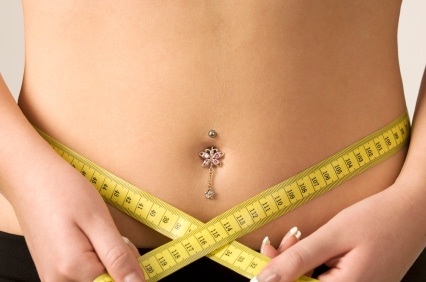
Most bloating that occurs transiently after a meal isn’t due to a serious medical condition, but it can be a sign of digestive problems – or even an early sign of ovarian cancer. That’s why it’s a good idea to check with a doctor if you have bloating, especially if it doesn’t go away after a meal. Once you get a clean bill of health, there are some simple ways to keep abdominal bloating after meals in check.
Gas in the Intestines Can Cause Abdominal Bloating
It’s normal to produce gas. Not all people who get bloated after a meal overproduce gas, some are just more sensitive to its effects – and their abdominal muscles relax and distend even when the intestines aren’t full of large amounts of gas. This is true of people who have the functional intestinal problem called irritable bowel syndrome.
Still, if you’ve recently increased the amount of fiber in your diet, it can cause temporary abdominal bloating until the bacteria in your intestines adjust to getting more fiber. Cutting back on high-fiber foods that are known gas producers may help. Some of the biggest offenders are beans, onions, wheat, broccoli, Brussels sprouts, cabbage, and asparagus. Introduce fiber more slowly into your diet to prevent bloating.
If you’re lactose-deficient, as many adults are, you’ll have problems breaking down the carbohydrates in milk products. This can cause diarrhea, flatulence, and, you guessed it – abdominal bloating.
Some people also have problems breaking down fructose, the sugar in soft drinks, fruits and some vegetables such as artichokes. Another culprit is sorbitol, a sugar alcohol found naturally in some fruits and used to sweeten some packaged products such as chewing gum and sugar-free items.
The best way to find out if these foods are the problem is to keep a food diary. Try eliminating gas-producing foods, and see if your symptoms improve. Eliminate dairy foods for five days to see if the problem is lactose intolerance, and then gradually add them back to see if the symptoms return. Stop eating foods that contain sorbitol and artificial sweeteners that aren’t easily digested. Eliminate fruit and soft drinks that contain fructose for five days, and see if you get less bloating after eating.
If beans and vegetables are the problem, you can try a tablet available from the drugstore called Beano. It helps to break down the complex carbohydrates in these foods into forms that can be digested. This reduces gas and bloating after a meal. Be forewarned. They don’t work for everyone.
Air Swallowing Can Cause Abdominal Bloating After a Meal
Some people, especially nervous types, swallow too much air when they eat – a condition called aerophagia. The key here is to eat slowly and reduce the amount of talking you do during a meal. Limit the amount of liquid you drink at mealtime – and don’t drink out of a straw. Don’t smoke or chew gum, which also contributes to air swallowing and aerophagia – and don’t drink carbonated drinks.
Try taking an over-the-counter gas-relief pill such as Gas-X before meals. These pills help break up air bubbles, although they aren’t effective for everyone. A better solution is to train yourself to swallow less air by eating more slowly and not gulping when you eat.
Other Tips for Reducing Abdominal Bloating
Limit the amount you eat at a meal. People who have abdominal bloating after eating sometimes have a slower rate of gastric emptying. If this is the case, it’s better to eat five small meals a day than two or three large ones, especially if you have a problem with bloating. Limit the amount of fat you eat with a meal since high-fat foods move more slowly through the digestive tract. Eat a container of yogurt daily that contains active bacterial cultures. These “good bacteria” can help offset the effects of gas-producing bacteria.
When you have abdominal bloating after eating, it’s tempting to go lie down – but taking a brisk walk is a better idea since it helps to move gas and air through the intestines.
The Bottom Line?
Bloating after a meal is no fun. For some, it can be a sign of digestive issues or other health problems, which is why it’s important to see a doctor if it persists – but for most people, simple lifestyle changes such as these can help.
References:
Merck Manual. Eighteenth edition. 2006.
Johns Hopkins. “Digestive Health Special Report”
prevent bloating, abdominal bloating, bloating after eating, bloating after a meal, aerophagia
Bloating after a meal is a common problem – and one that can usually be corrected by dietary and lifestyle changes. This article, written by a physician, discusses the two main causes of abdominal bloating after a meal, and how to prevent it.
Related Articles By Cathe:
6 Common Causes of Water Weight Gain
Five Common Causes of Bloating After a Meal
That Stubborn Abdominal Pooch! Surprising Reasons Your Abs Aren’t Flat
Is Belly Bloating Hiding Your Six-Pack? Find Out What Causes It and How to Deal With It

